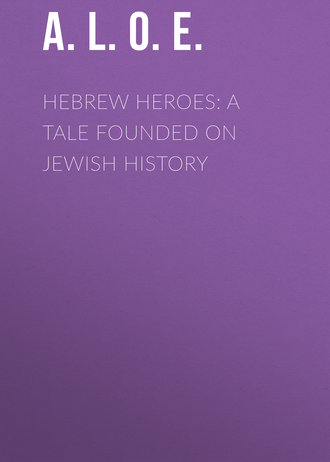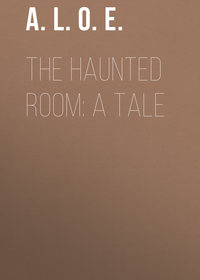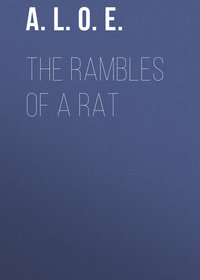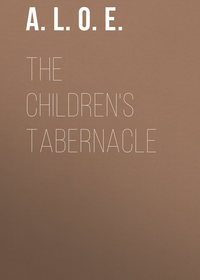 полная версия
полная версияHebrew Heroes: A Tale Founded on Jewish History
With dilating eyeballs and a look of fierce triumph Abishai leant over the brink, trying to distinguish through the deepening gloom the lifeless form of his victim.
"I have silenced the Gentile once and for ever!" cried the fierce Hebrew through his clenched teeth. "I said not 'Content' when the question was put, but I say it now!" He drew back from the edge, wiped the moisture from his heated brow, and left a red stain upon it.
"Ere I go to rest," said the stern Jew, "I will let Hadassah know that my arm has achieved that safety for her and our brave companions which her wild folly would have sacrificed. I marvel that Judas, son of Mattathias, a bold man, and deemed a wise one, should have let himself be swayed from his purpose by the idle words of a woman. But I trow," added Abishai with a grim smile, "that a glance from Zarah went further with him than all the pleadings of Hadassah. It is said amongst us, their kinsmen, that these twain shall be made one; but this is no time for marrying and giving in marriage, when the unclean swine is sacrificed on God's altar, and the shadow of the idol darkens the Temple, and the sons of Abraham are given but the alternative to defile themselves or to die. The day of vengeance is at hand! may all the enemies of Judah perish as that poor wretch has perished this night!"
Abishai sought for his dagger, and found it; he then left the scene of his act of ruthless cruelty, with a conscience less troubled by so dark a deed than it would have been had he rubbed corn between his hands on the Sabbath, or neglected one of the washings prescribed by the traditions of the elders.
CHAPTER V.
THE DREAM
At sunrise on the following morning two women were seated on the ground, in the back part of a small flat-roofed house, situated in a very secluded spot amongst the hills, not a mile from Jerusalem. They sat opposite to each other, engaged – after the manner of the East – in grinding corn, by moving round, by means of handles, the upper millstone upon the nether one.
The room in which they were, if room it could be termed, was a narrow place on the ground-floor, partitioned off from a larger apartment, and devoted to holding stores, and other such domestic uses. Here corn was ground, rice sifted from the husk, and occasionally weaving carried on. Large bunches of raisins hung on the walls, jars of olive-oil and honey were neatly ranged on the floor; nor lacked there stores of millet, lentiles, and dried figs, such being the food on which chiefly subsisted the dwellers in that lonely home. A curtain, now drawn aside divided this store-place from the larger front room, which opened to the road in front. It had a door communicating with a small patch of cultivated ground behind, in which were a few flowers tended by women's hands, the fairest clustering round a bright little spring which gushed from the hill on whose steepest side the small habitation seemed to nestle.
One of the women, busy with the laborious task of grinding, was a Hebrew servant, past the prime of her days, but still strong to work; the other was fair and young, her delicate frame, her slender fingers, looking little suited for manual labour. With a very sad countenance and a heavy heart sat Zarah that morning at the millstone, engaged in her monotonous task. It was not that she was unwilling to spend her strength in humble toil, or that she murmured because her grandmother Hadassah had no longer men-servants and but one maid-servant to do her bidding. Zarah had too much of the spirit of a Ruth to shrink from work, or to complain of poverty, if shared with one who was to her as a mother; nay, her cheerfulness at labour was wont to gush forth in song. It was not a personal trial that now made the tears flow from Zarah's lustrous eyes, as she slowly turned round the millstone; no selfish sorrow drew heavy sighs from her bosom, as she murmured to herself, "Oh, cruel – cruel!"
"Peace be unto you, my child. You are early, and it was late ere you could retire to rest," said the voice of Hadassah, as, pale and sad in aspect, the widow lady entered the apartment.
Zarah arose from her humble posture, approached her grandmother, first meekly kissed the hem of her garment, and then received her tender embrace.
"I could not sleep," faltered the maiden; "I dared not close my eyes lest I should dream some dream of horror. Oh, ruthless Abishai, most cruel of men! will not the All-merciful, who cares for the stranger, require that young Greek's blood at his hand?" – Zarah covered her face and wept.
"His was an unrighteous and wicked deed," said Hadassah.
"And it was I who betrayed the stranger," sobbed Zarah. "It was my start and exclamation which directed the murderer's eyes to his place of concealment! I shall never be happy again!"
"Nay, you did no wrong, my white dove," said Hadassah, tenderly drawing the maiden closer to her bosom; "the guilt lies on the head of Abishai, and on his head alone. Had he not been the beloved of my dead Miriam, my only daughter, never more should that man of blood cross the threshold of Hadassah."
"I never wish to look on Abishai again!" cried Zarah, with as much of anger as her gentle nature was capable of feeling, flashing from under her long dark lashes. "He might have trusted one whom Judas could trust; the face of that Greek was a face which could not deceive;" and the maiden added, but not aloud, "the stranger – when he stood with folded arms, so calm, so beauteous, so noble, and bowed his head, and said 'Content' when his life was trembling in the balance – looked to me as one of the goodly angels that came to Sodom at eve! Better, if he must needs die, that the Greek should have fallen by the javelin of my brave kinsman Judas, than by the dagger of Abishai. Mother," cried Zarah, suddenly raising her head, and looking into the face of Hadassah with an earnest, pleading gaze, "may we not hope that the stranger's soul has found mercy with God? How could the young Gentile worship One whom he knew not? – his blindness was inherited from his parents – he did not wilfully turn away from the light! Oh, say that you think that the All-merciful has had compassion on the murdered Greek! did not the Lord spare Nineveh – pitied He not even the little ones and the cattle?"
"I do think it – I do firmly believe it," said Hadassah, raising her eyes towards heaven; "verily the dream that visited me last night must have been sent to assure me of this."
"Tell me your dream, mother," cried Zarah, who always addressed by this title the parent of her father.
"Come with me into the front room, my child; leave Anna to prepare our pottage of lentiles, and I will tell you my dream," said Hadassah, leading the way into what might, in a European dwelling, have been called the sitting-room. This, with the place which they had just quitted, and two sleeping apartments above, which were reached by a rough stair on the exterior of the dwelling, constituted all the accommodation of Hadassah's small house, if we except the flat roof, surrounded by a parapet, often used by the ladies as a cool and airy retreat.
Hadassah and her grand-daughter seated themselves in a half-reclining posture upon skins that were spread on the tiled floor; and while Zarah listened with glistening eyes, the Hebrew widow told her dream to the maiden.
"Methought, in the visions of the night – for I snatched a brief hour of repose after our return from the burial – I beheld two women before me. They were both goodly to look upon, with a strange spiritual beauty not seen on this side of the tomb. The feet of the women rested not on the earth, but they gently floated above it; the air seemed purpled around them, and fragrant with the odour of myrrh. The first woman bore in her hand a scarlet cord, the other a bundle of golden corn.
"'Hadassah,' said the first, 'I am Rahab, of the doomed race of Canaan, yet received as a daughter of Abraham. For the sake of David, born of my line, and for the sake of Him who was the Root of Jesse (Isa. xi. 10) and shall be the Branch (Isa. xi. 1), have pity upon the stranger.'
"And the second woman, who was exceeding fair, spoke to me in like manner: 'Hadassah, I am Ruth, of the guilty race of Moab, yet received as a daughter of Abraham. For the sake of David, born of my line, and for the sake of Him who was the Root of Jesse and shall be the Branch, have pity upon the stranger.' And so the two bright visitants vanished – and I awoke."
"Would that your dream had been sent to Abishai!" exclaimed Zarah; "then might he not through life have borne the brand-mark of Cain!"
"Hark!" cried Hadassah, suddenly; "was that a groan that I heard?"
Zarah had heard the sound also, and was on her feet and at the door before Hadassah had ended the sentence.
"Oh, mother – it is he – the stranger – he is dying!" exclaimed Zarah, trembling as she bent over the form of Lycidas, which lay stretched on the ground, close to the threshold.
The injuries which the young Greek had received from the dagger and the fall, though severe and dangerous, had not proved fatal. The fresh morning air had restored him to consciousness; unable to rise, Lycidas had yet managed to drag himself feebly along for some distance, till, as he reached the nearest dwelling, the strength of the Athenian had utterly failed him, and he had swooned at the door of Hadassah.
"Bear him in – he bleeds!" said Hadassah; and after calling the strong-armed Anna to aid them, the Hebrew ladies themselves carried the senseless form of the stranger into the house, and beyond the curtain-partition into that back portion of the dwelling described in the beginning of this chapter. For some time undivided attention was given to efforts to restore consciousness to the wounded man. Hadassah, like many of her countrywomen, had knowledge of the healing art. Zarah brought of the balm of Gilead and reviving wine; Anna dragged into the inner room mats and skins, that the sufferer might have something softer to rest upon than the hard floor. Zarah and the servant then retired, by the order of Hadassah, leaving her to examine and bind up the wounds of Lycidas, which she did with tenderness and skill When all had been done which could be done, Hadassah drew aside the curtain-screen, and rejoined Zarah and Anna in the front apartment, where the latter was engaged in removing the crimson stains left by the wounded Greek on the floor and threshold.
"Go on the road, Anna," said the widow; "carefully efface any marks by which a wounded man could be tracked to my dwelling. No one must know that the stranger is here."
"If Abishai heard of it, even your roof would not protect the youth," said Zarah, turning pale at the thought of a repetition, in the sacred precincts of home, of the horrible scene of the previous night. "Oh, mother, think you that the stranger will live?"
"He may; youth can swim through stormy waters," replied Hadassah; "but – may I be forgiven the inhospitable thought! – I would that the Greek had come to any other house rather than to mine."
"So few visitors ever seek this spot – so few strangers ever pass it – we lead lives so retired – we can, better than most, conceal a guest," observed Zarah.
The brow of Hadassah was clouded still. In that small dwelling, with a fair girl under her care, the widow lady was unwilling to harbour for weeks, or more probably months, a man, and that man a Gentile. Anxiously she revolved the matter in her mind, but no other course seemed to open before her. She could not be guilty of the cruelty of turning the helpless sufferer out to die.
"On Abishai's account," said Hadassah, "I dare not seek out the friends of the Greek, if friends he have in Jerusalem, and ask them to bear him thence. To do that, after Abishai's murderous attempt on his life, would be to deliver over Miriam's husband to the executioner's sword. This young man is bound alike by honour and gratitude to preserve silence as to what passed by the grave; but there is nothing to prevent him from seeking, and much to induce him to seek, retribution on a would-be assassin, who violated the pledge of safety given to the Greek. Would, I repeat, that this stranger had come to any house rather than mine!"
"Mother, remember your dream!" exclaimed Zarah, who, in the secret depths of her heart, did not share Hadassah's regret. Compassion for the suffering – admiration for the beautiful and brave, – combined to awaken in the maiden strong interest in the fate of the stranger. Zarah was well pleased that her grandmother's hospitality should be to him some reparation for a deep wrong sustained from one of her family.
"Yes," said Hadassah, thoughtfully; "that dream must have been sent to prepare me for this. The Lord hath given me a work to perform, and He will not let His servant suffer for striving to do His bidding. The wounded stranger, Gentile though he be, needs hospitality, and I dare not refuse it. If the Lord hath guided him to the home of Hadassah, the Lord will send a blessing with him." And trying to stifle her misgivings, the widow lady returned to her guest.
CHAPTER VI.
THE JOURNEY HOME
Before the sun had risen above the horizon on that day, Judas, son of Mattathias, of the noble family of the Asmoneans, started on his long homeward journey. He had not re-entered Jerusalem during the night; almost as soon as he, with the assistance of Joab and Isaac, two of his companions, had filled up with earth the grave of the martyrs, he had skirted the city from the east to the west, and turned his face towards Modin.
It would scarcely have been deemed by any one who might have seen the princely Hebrew ascending the western hill with his quick, firm tread, that the greater part of the preceding night had been spent by him in severe toil, and none in sleep. His soul, filled with a lofty purpose, so mastered the infirmities of the flesh, that the Asmonean seemed to himself scarcely capable of feeling fatigue, and set out, without hesitation, on a journey which would have severely taxed the powers of a strong pedestrian after long uninterrupted repose.
As he reached the highest point of one of these hills which stand round Jerusalem, like guardians of the holy and beautiful city, Judas paused and turned round to take what he felt might be a last look of Zion, over which the sun was about to rise. He gazed on the fair towers, the girdling walls, the sepulchres in the valleys, the temple crowning the height, with that intense love which glows in the bosom of every Hebrew deserving the name, a love in which piety mingles with patriotism, glorious memories with still more glorious hopes. From the Asmonean's lips burst the words in which the Psalmist has embalmed that love for all generations, – Beautiful for situation, the joy of the whole earth, is Mount Zion, the city of the great King. Mark ye well her bulwarks, consider her palaces; that ye may tell it to the generation following. Pray for the peace of Jerusalem: they shall prosper that love thee. Peace be within thy walls, and prosperity within thy palaces. If I forget thee, O Jerusalem, let my right hand forget her cunning; if I do not remember thee, let my tongue cleave to the roof of my mouth.
Faith was to the Asmonean as the rosy glow preceding the sunrise, which then flushed the eastern sky. His eye rested on the Temple; now desecrated, defiled, abandoned to the Gentile, and he remembered the promise regarding it: The Lord whom ye seek, shall suddenly come, to His Temple, even the Messenger of the Covenant whom ye delight in (Mal. iii. 8). Then the Hebrew's gaze wandered beyond to a fair hill, clothed with verdure, and his faith grasped the promise of God: Then shall the Lord go forth… and His feet shall stand in that day upon the Mount of Olives (Zech. xiv. 3, 4). Hope and joy were kindled at the thought. As surely as the hill itself should remain, so surely should a Temple stand on Mount Zion, till the Messiah should appear within it. God is not a man, that He should lie; neither the son of man, that He should repent: hath He said, and shall He not do it? (Num. xxiii. 19).
"Oh, that the Messiah might come in my day!" exclaimed the Asmonean; "that my eyes might behold the King in His beauty; that my voice might join the united acclamations of Israel, when the Son of David shall be seated on the throne of His fathers, and His enemies shall be made His footstool! That I might see the whole world worshipping in the presence of the Seed of the woman who shall bruise the serpent's head!" (Gen. iii. 15). The Hebrew grasped his javelin more firmly, and his dark eye dilated with joy and triumph. "But the night is not yet past for Israel," he added, more sadly; "the voice is not yet heard in the wilderness, Prepare ye the way of the Lord (Isa. xl. 8); we may have yet much to do and to suffer ere the Sun of Righteousness arise."
Then a softened expression stole over the features of the Asmonean, as he gazed in another direction, but still with his face turned towards the east. He could not see a white dwelling nestling under the shadow of a hill, but he knew well where it lay, and where she abode to whom he had bidden on that night a long, perhaps a last, farewell. The Asmonean stretched out his hand, and exclaimed, "Oh! Father of the fatherless, guard and bless her! To Thy care I commit the treasure of my soul!" And without trusting himself to linger longer, Judas turned and went on his way.
It was the month of Shebet, answering to the latter part of our January, and Palestine was already bright with the beauty of early spring. The purple mandrake was in flower, the crocus, tulip, and hyacinth enamelled the fields, with the blue lily contrasting with thousands of scarlet anemones. The almond-tree and the peach were in flower, and fragrant sighed the breeze over blossoms of lemon and citron. The winter had this year been mild, and some figs left from the last season still clung to the boughs yet bare of foliage. The vine on the terraced hills was bursting into leaf, and already in the fields the rising corn showed its young blades above the ground. But Judas was too much absorbed with his own thoughts to pay much attention to the landscape around him; with Israel the spiritual winter was not over, her time for the singing of birds had not come.
Onwards pressed the traveller without resting, till at about noonday he reached the valley of Ajalon. There was a fountain by the side of the road, and here the weary man slaked his thirst, and sat down for awhile to rest beneath the shade of some date-palms. The Asmonean took from the scrip which he carried his simple repast of dried figs, laved his brow and hands in the cooling water, blessed God for his food, and began to eat.
Ere many minutes had elapsed, a woman in the widow's garb of mourning, bearing a child of about six years old on her back, dragged her weary steps to the fountain by which the traveller was seated. She placed her boy on the ground, drank of the water herself, and gave to her son to drink. Her appearance denoted extreme poverty, and the child was evidently suffering from sickness.
Judas divided this slender supply of provisions into three portions, and with the courteous salutation of "Peace be with you," offered one to the widow, and one to the boy.
"The blessing of the God of Abraham be with you!" exclaimed the poor woman; "your servant hath not tasted food since sunset." And, seated on the turf not far from Judas, the widow and her son partook of the dried figs with the eagerness of those who are well-nigh famished.
"Your child looks ill," observed the Asmonean, regarding with compassion the wasted shrunken frame of the boy.
"He will not suffer long," replied the widow, with the calm apathy of despair. "I laid his father's head in the grave last month, and I shall lay Terah's head beside him this month. The seal of death is upon him; I shall soon be alone in the world."
"Nay, despair not, God is good; the child may yet live," said Judas.
"Why should I wish him to live," murmured the widow. "His father was taken from the evil to come, the boy will be taken from the evil to come. Jerusalem is defiled, the land is in bondage, Israel is given a prey to the heathen! The faithful are few in the land, and persecution will sweep these few away. There is no resting-place but under the sod, no freedom but in the grave. The name of Judah will soon be blotted out from amongst the nations!"
"Never!" exclaimed Judas, with energy; "never, while the God of Truth lives and reigns! Judah can never perish. The vine that was brought out of Egypt may be broken, her branches torn away, her fruit scattered, the boar out of the wood may waste it, and the wild beast of the field devour, but yet Israel shall blossom and bud, and fill the face of the world with fruit (Isa. xxvii. 6). Were but one man left of God's chosen people, yet from that one man should spring the Deliverer who shall yet speak peace to the nations, and reign for ever and ever!"
"Could I but hope – " faltered the widow.
"Can you not believe?" exclaimed the Asmonean. "See yonder – look to the east – there is Gibeon, over which the sun stayed at the voice of Joshua; over this valley of Ajalon hung the moon arrested in her course in the day when the Amorites fled before Israel. He who raised up Moses, Joshua, and Gideon, can by human instruments, or without them, repeat the miracles wrought of old, and again deliver His people."
As he concluded the last sentence, the Asmonean rose to continue his journey; he could give his weary limbs but little time for rest, for long was the distance which he yet had to traverse.
"My home is but a furlong further on," said the widow, also rising, "and I have again strength to go forward."
She was about to lift up her boy, but Judas prevented her. "I can relieve you of that burden," he said, and raised the child on his shoulders.
They had proceeded for some way in silence, the widow pondering over the speech of the wayfaring man, when from behind was heard the clatter of hoofs and the jingle of steel. The child, whom the Asmonean was carrying, turned to gaze, and exclaimed in fear as he grasped the locks of his protector, "See – horsemen in bright armour, with banners and spears! fly, fly! – the Syrians are coming!"
Judas did not turn nor alter his pace, he merely went closer to the side of the cactus-bordered road, to give more space to the horsemen to pass him. On rode the Syrians in goodly array, their steel glittering in the sunlight, the dust rising like a cloud around the hoofs of their horses. In the centre of the line was a gorgeous arabah, or covered cart with curtains, to which the troop of soldiers appeared to form an escort. There was an opening in the roof of this arabah, evidently for the convenience of accommodating within it a figure too high to be otherwise carried in the conveyance, for out of the opening appeared a white marble head of Grecian statuary. Judas and his companion regarded it with the aversion and horror with which the sight of an idol always inspired pious Jews.
When the Syrians had passed the travellers, and the clatter of their arms had died away in the distance, the widow wrung her hands and exclaimed, "Yonder ride Apelles and his men of war to Modin, to do the bidding of the tyrant; and they bear the accursed thing with them, to be set up on high and worshipped. Alas! they will compel all the Hebrews at Modin to bow down to their idol of stone."
"Perhaps not," said Judas, calmly.
"All men will be forced to offer sacrifice," cried the woman; "there will be no way of escaping the pollution."
"Solomona and her sons found one way," observed the Asmonean, "and God may provide yet another."
The traveller had now reached the door of the widow's humble dwelling. Judas set down his living burden, and the mother thanked the kind stranger, and asked him to come in and rest.
"I cannot abide here," replied Judas; "a long journey is yet before me;
I must be at Modin this night."
"At Modin!" exclaimed the astonished woman, glancing up at the worn weary countenance of the speaker. "Why, the horsemen will scarcely reach Modin this night, unless, indeed, the king's business be urgent."
"My King's business is urgent," said the Asmonean, as he tightened his girdle around him, and with a grave, courteous salutation to the woman, he went on his way.
The widow watched his princely form for some time in silence, then exclaimed, "That can be none other than Judas, the son of Mattathias; there is not a second Hebrew such as he. Ah, my Terah," she added, addressing herself to her son, "there is a man whom the Syrians will not frighten."





